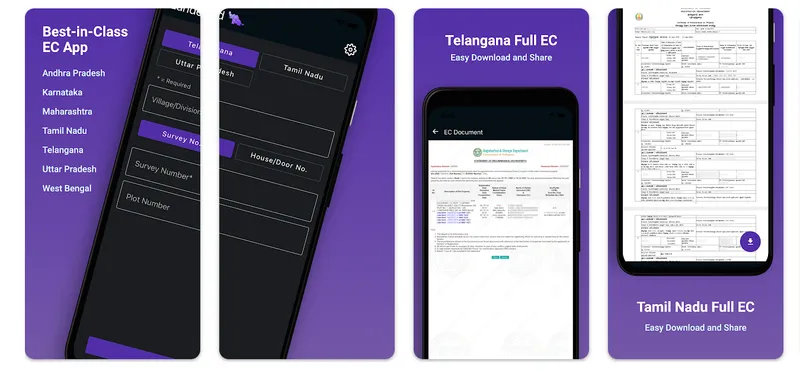Proptech startup Landeed helps users check property records within seconds
In India, unlike in other countries, land ownership has largely been under the “presumptive ownership” model. Bengaluru-based Landeed’s software helps individuals reduce the hassle of checking records by more than 10X.
About 67% of all court cases in India deal with land-related disputes. One of the main reasons for these fights is that land ownership here has largely been based on the occupancy of the property—presumptive ownership—rather than the legal right to the title.
If you have ever purchased a property in India, chances are that you’ve had to deal with confusing paperwork from several government departments to verify property titles.
To address this issue, Sanjay Mandava, ZJ Lin and Jonathan Richards started in 2022.
The Bengaluru-based proptech startup enables owners, agents, developers, and legal advisors to check real estate records for building, lending, and transacting property.
Landeed says its platform helps users search property titles 10X faster than existing processes. Individuals can receive documents about their land at a nominal fee.
The startup introduced a subscription model about four weeks ago in Telangana, wherein users across the spectrum would have to pay Rs 199 per month to receive the documents.
“We will soon be launching it in other states. When it comes to government pricing, different governments charge different prices. For example, the Telangana government charges Rs 500 per property to look up on the government app,” Sanjay adds.

Screenshot of the app
The seeds
Sanjay says the inspiration to start Landeed came from his own experience in dealing with encroachments on his property.
"India does not have a common database when it comes to the paperwork —like title deeds—concerning the purchase of real estate. Each state has a different way of producing documents that then go by different names— document number, survey number, circle rate, guideline value—that vary with each new state," highlights Sanjay.
In addition to this, the existing processes for obtaining property details and conducting due diligence often involve looking through different government departments and waiting long periods to receive documents.
How does Landeed work?
Users can enter a particular survey number or their area to pull up a document. Interestingly, that is actually what the government also charges for, however, the process takes time.
Over the past four months, the company has seen over 1.7 million property searches on its platform. Individuals have even received transaction trails for the past 20 years.
In addition to the document, Landeed also provides multiple other data points on a single screen such as guideline values, Encumbrance Certificate—a document that shows that the property in question is free from any monetary or legal disputes—amongst others.
As sourcing from the government takes time, users find it easy. In addition to this, users pay for document aggregation.
Currently, the startup’s subscriber base includes property brokers, real estate developers, lawyers as well as core consumers looking to buy/sell land.
Last month, the startup raised Rs 19.5 crore ($2.5 million) in a pre-seed funding round led by Justin Hamilton (CEO, Clutterbot) Goodwater Capital, Olive Tree, Kunal Shah (CRED), Manmohan Chandolu, Chris Maurice (Yellow Card), Christian Kaczmarczyk (Third Prime VC) and AVCF Fund and nine YCombinator alum.
Currently, the startup is expanding the existing $2.5 million round to $5 million due to high interest and oversubscription, Sanjay says.
Market opportunity and growth
The real estate market is expected to reach $1 trillion in market size by 2030, up from $200 billion in 2021 and contribute 13% to the country’s GDP by 2025.
Title insurance is a form of insurance that protects property owners and lenders from defects in ownership.
"Title insurance alone is a nearly $25 billion market in the US and has recently been introduced in India. We believe there are a lot larger segments to tap in India beyond title insurance and in the coming months, we are planning to enable property title embedment on the blockchain," the founders in say a joint statement.
Currently present in Uttar Pradesh, Karnataka, Andhra Pradesh, Telangana, Tamil Nadu, Maharashtra and West Bengal, Landeed is now expanding to other states.
“Our engineering teams are currently working on adding more states to the platform. Currently people are able to search for property data across India through a single platform. We are the only application offering this feature. Just, four weeks ago, we began monetising our search engine and introduced a subscription model in Telangana where users would have to pay Rs 199 per month,” he adds.
Landeed’s app has over 600,000+ installs across IOS and Android. The startup will soon be adding a feature wherein individuals can enter the property address, linking it to the survey number to help individuals search for their documents more easily.
The founding team
Sanjay, ZJ Lin and Jonathan have known each other for nearly seven years, having founded GoLorry–a platform aimed at consolidating the fragmented Indian trucking market into a single service provider. The platform looked at providing India’s first truly instant pricing on any route.
GoLorry is getting merged into DeFi friendly digital banking company ANQ Finance. All three founders are technical advisors and are assisting in the transition process.
Both Landeed and GoLorry have been part of YCominator cohorts. GoLorry was a part of YC W16 and Landeed is in the current S22 batch.
Landeed has a team of eight people, with Co-founder Jonathan being the CTO taking care of the back-end and architecting its engineering. ZJ is the Co-Founder and CPO leading the front-end and growth. Sanjay takes care of everything non-code.



![[Funding roundup] Adventures Overland, Landeed, LearnQ, ReDesyn close early-stage deals](https://images.yourstory.com/cs/2/bc14afb0357911eca2270b39b804102d/CopyofImageTaggingnoframesEditorialTeamMaster6-1660126635251.png?fm=png&auto=format&h=100&w=100&crop=entropy&fit=crop)




